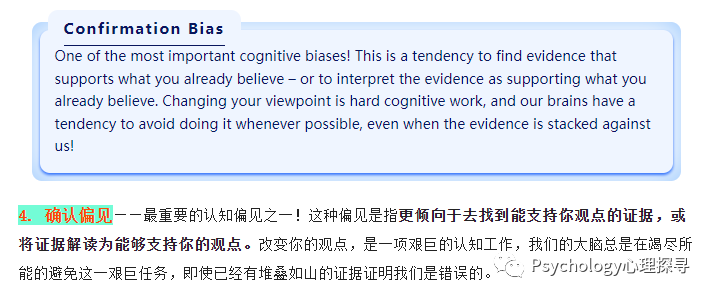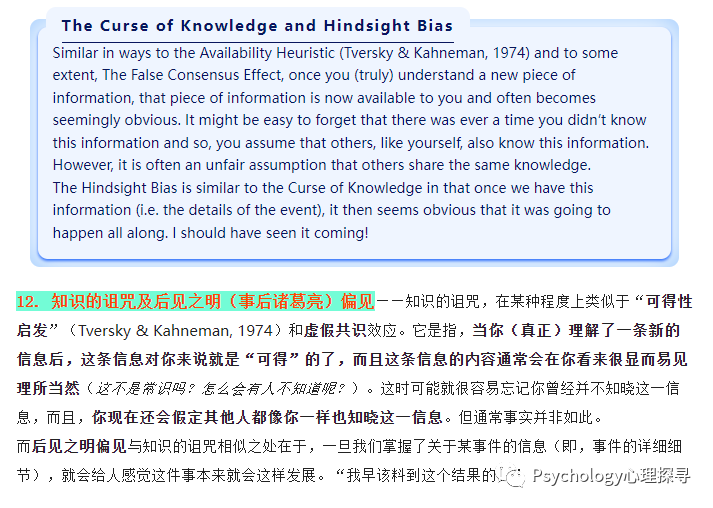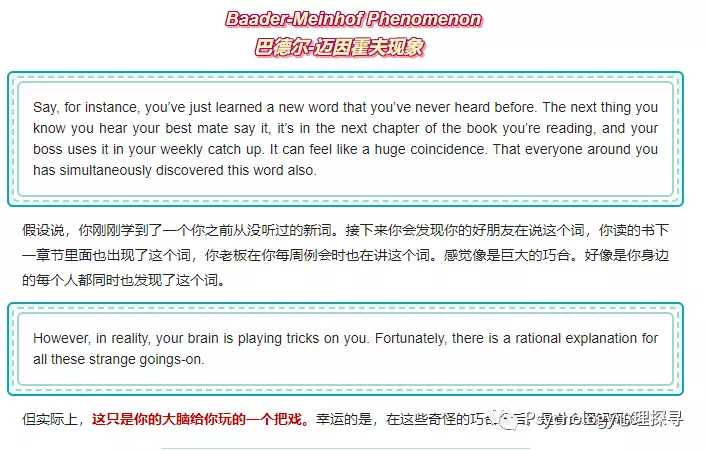幻想型感情关系(Fantasy Relationships)——用你自己给你画饼
KEY POINTS
要点
Fantasies can misguide you in relationships.
幻想在感情关系中会误导你。
It is important to be aware of how past relationships may impact present ones.
了解过去感情经历对当前感情产生怎样的影响,这很重要。
Good relationship choices lead to greater happiness.
良好的感情关系选择会带来更高的幸福度。
A real relationship is often different from how you imagined, but that can make it more satisfying.
一段真实的感情通常与你想象中的不同,但却反而会给人带来更高的满意度。
Frequently, my patients want to form new relationships unburdened by patterns, memories, and fears imported from earlier (usually failed) connections. They want to be fully present in a relationship and resist versions of themselves warped by characters from (what they hope is) a discarded past.
我的患者们在建立新恋情方面,通常想要摆脱过去的(通常失败的)关系模式、记忆和恐惧。他们想要全身心真正投入一段新感情,摆脱(他们希望已成过往的)前任们在他们身上所遗留的各种影响。
But Debbie could only wish to be emotionally independent. “There’ve been a lot of men in my life,” she said. “And none are really gone.” What she meant was that every time she met someone new, she’d react as if they were some warmed-over version of a former guy. She never felt “free,” to use her word, to learn about them on their own terms.
但 Debbie 的问题却是很难实现情感独立。“我生命中有很多男人,”她说,“但他们都阴魂不散。”她的意思是,每当她遇到某位新的男士,都会将其当作自己某位前男友的某种新瓶装旧酒版本而做出反应。用她自己的话说,她从未感到能够“自由”地去将他们视为不同个体去了解他们。
She’d make assumptions as if they were someone she had known; she’d act on those assumptions; the guy would become bewildered, annoyed, and decide that the whole thing just wasn’t worth it. By the time she came to see me, she knew what was going on—that she was in thrall to her old relationships—but she couldn’t help herself.
她会无端假设,仿佛她已经认识他们。她会基于这些假设而做出某些行为,让对方感到疑惑、恼怒,并觉得这样一段恋情并不值得。在她来向我求助之前,她很了解自己问题在哪儿——她完全被囿于往昔感情经历中——但她却无法让自己解脱。
Debbie was attractive, around 35, and divorced. She’d come to the city three years earlier, assuming that she’d make a new start. As a commercial artist with an established client base, it shouldn’t have been hard, at least on its face. But like most people who assume that a change in geography somehow changes them, her relationships remained rocky. As we spoke, she acknowledged that she felt out of control, destined to make choices that would continue to destabilize her.
Debbie 很有魅力,35岁左右,离异。三年前她来到这个城市,觉得自己会有个新的开始。作为有着成熟客户基础的商业画家,这本应不会很难,至少表面看起来应该如此。但如同大多数觉得换个新地方就能让自己脱胎换骨的人一样,她的感情也是一路坎坷。如前所述,她承认她感到失控,感到自己注定做出会继续损害自己的选择。
An affair that had sent her into retreat occurred just when Debbie thought that New York might change the course of her career. She had always been successful as a commercial artist, but, since making the rounds, she’d fantasized that—someday, of course—her work might be shown at MoMA. A few people suggested that she try serious art. It was a heady time. “No one ever before said I was that good.” In her spare time, she took painting classes. She approached galleries.
就在 Debbie 觉得纽约可能会改变她的职业生涯时,发生了一段感情经历,这段经历也让她选择逃离感情。她一直是一位成功的商业画家,但在四处参观后,她幻想着——当然只是未来某天——她的作品也可以在现代艺术博物馆被展览。一些人也建议她尝试严肃艺术。那段时间很让人上头。“之前从未有人说过我是那么厉害。”在她业余时间,她参加绘画课程,她联系各种画廊。
Unfortunately, a gallery owner approached her, although not as she might have wished.
不幸的是,一位画廊老板主动联系了她,尽管并非以她可能希望的方式。
Everard was a former Londoner who had come to New York ten years earlier, intending to work for a big auction house. But then he started an art advisory business on the side. Ultimately, he opened a gallery. When he met Debbie, he clearly had an eye for talent. Nor was he shy about letting her know. Their affair was fueled, in part, by his encouraging her ambitions as a budding, serious artist. He introduced her around. He sold a couple of her pictures. Mostly, though, he allowed her to imagine an alternative, glamorous existence of openings, international buyers, and commissions from MoMA trustees. “I got hooked, I guess, on my fantasies.”
Everard 曾住在伦敦,10年前来到纽约,希望能够在一个大型拍卖行工作。但之后他开始了艺术顾问这一副业。最终,他开设了一家画廊。当他遇到 Debbie时,很明显他能够慧眼识珠。同时他也毫无保留地让她知道他对她的赏识。他们这段感情的动力,部分程度上来自于他鼓励她朝着严肃艺术新星这一宏大志向前进。他给她介绍关系,他卖掉了她的几幅画,最重要的是,他让她能够想象另一种璀璨绚烂的人生:画展、国际买家、来自现代艺术博物馆管理层的委托作画请求等。“我被迷住了,我想,被我自己的幻想迷住了。”
When the affair inevitably ended (Everard found someone else to “encourage”), Debbie couldn’t shake how she’d felt around him. “I still have a hard time living in the real world,” she told me. “I want every guy to make me feel like Everard did—really going somewhere with my art.”
当这段感情不可避免结束后(Everard找到了另一个人去“鼓励”),Debbie 完全摆脱不了和他在一起时自己的那种感受。“我依旧很难活在现实世界,”她告诉我,“我想每个人都能够带给我 Everard 给我带来的那种感觉,也就是说,我的画作有一天真的可以大获成功。”
What interested me, however, was why. Even when she understood the motivations that inevitably led her to a fall, she still allowed them to take hold of her. Why would she give in to stirrings that she knew, from past relationships, did her no good? Perhaps, I think, because she always had. It had become a pattern. She couldn’t tell whether a relationship was based on real, growing affection or just on some high that she got, before it all crashed and burned.
而引起我兴趣的,却是为什么。即使她完全了解这些不可避免让她栽跟头的动机,她依旧让自己臣服于这些动机。为什么她会屈服于往昔恋情的遗留负面影响?我想,可能她一向如此。这已经成为了她的一种模式。她无法分辨一段感情是基于真实的、慢慢发展的爱意,还是只是基于某种宛若吸毒至嗨的状态,而且之后不可避免会轰然崩塌。
The pattern emerged quickly, as soon as she started college. Before she graduated, she'd met a local painter whom, she thought, was the handsomest man she had ever painted. “I married him because he inspired me. Even though we competed.”
这种模式快速浮现,早在刚进大学时就已成形。在她毕业之前,她曾遇到一个当地画家,当时她觉得他时她画过的最帅的男人。“我和他结婚了,因为他激励了我,尽管当时我们之间也存在竞争。”
The problem was that she met someone new. He was a professor of statistics at a local university, and they’d been introduced by a mutual friend.
而问题是,她遇到了另一个人。他是当地一座大学的统计学教授,一位共同的朋友介绍他们认识。
When Debbie started dating him, he seemed nice enough, but (at least from her perspective) there was no spark. “He doesn’t know much about art,” she told me. “He says that if I want to go in the direction of serious painting, then I should try, but he has no basis for encouraging me.” In other words, here was a guy who didn’t fit Debbie’s pattern. In fact, he was the opposite: he didn’t flatter her or push her towards serious art, and he wasn’t likely to hurt her or leave her.
当 Debbie 开始和他约会时,他看起来人很好,但却(至少在她看来)没有火花。“他对艺术并没有很多了解,”她告诉我,“他说如果我想要朝着严肃艺术的方向发展,那么我应该尝试一下,但他并没有鼓励我前行的基础。”换言之,这个人并不符合 Debbie的 模式。实际上,他完全恰恰相反:他没有恭维她,或将她推向严肃艺术,而且他也不可能会伤害她或离开他。
The challenge with Debbie was to help her distinguish between short-term excitement—the pattern that we’d discovered—and what might lead to happiness in the long run. Okay, Larry had not been exposed to art. But, as it turned out, he was really nice to Debbie. He wasn’t selfish, and wasn’t preying on her ego.
在治疗 Debbie 方面存在的挑战是,帮助她区分短期兴奋——我们已经发现的她的行为模式——和长期幸福。好,Larry 没接触过艺术,但是,他却真的对 Debbie 很好。他不自私,而且也没有在利用她的 Ego。
I suggested that Debbie give him a chance. “You could teach him about art. Bring him to some galleries.” The point was not to allow old patterns, deeply rooted in her past and in her fragile ambitions, to derail a promising relationship. “Even if Larry is not, finally, The One,” I said, “at least you’ll have the experience of being with someone who doesn’t recycle your self-defeating tendencies.” I hoped she’d notice the difference, and get to like it.
我建议 Debbie 给他一个机会。“你可以教他艺术,带他去一些画廊。”重点是,不要让深深植根于她过去人生和脆弱志向中的固有模式摧毁一段很有希望的感情。“即使最后 Larry 并非你的真命天子,至少你终于可以有一段不再重复往昔负面模式的感情经历。”我希望她能够注意到这种不同,而且会喜欢上这种不同。
When we seek romantic happiness, we are frequently our own worst enemies. We prefer to live out temporary fantasies rather than pursuing real-life, long-term goals. We tell ourselves, “Don’t settle,” but what we’re really saying is that we don’t want to compromise with our fantasies.
当我们追求爱情时,我们通常是自己最大的敌人。我们更愿意追求短暂的幻想,而非追求切实的、长期的目标。我们告诉自己,“不要将就”,但我们真正想说的却是:“我们不想让自己的幻想妥协。”
At some point, however, we have to learn how to navigate our fantasies, and the best way is to actually see how it feels. If we learn anything from Debbie, therefore, it’s that trying to get past the pull of our fantasies —especially when they are tied up with our greatest ambitions—is far from easy. We can even be aware that we’re falling into our old ways and do it anyway. But if we ever want to be happy for the longer term, without all the usual awful blowback, then we have to try.
但在人生某个阶段,我们都不得不学会如何走出这些幻想,而最佳方式就是看它带给你的真实感受。因此,如果我们从Debbie身上学到任何东西,那就是,摆脱幻想的吸引——尤其这些幻想被与你的宏伟志向捆绑在一起时——远非易事。我们甚至虽然会意识到我们在重蹈覆辙,却依旧会义无反顾去做。但如果我们想要获得长期幸福,不再一如既往地被反噬,那么我们就需要尝试走出这些幻想。


